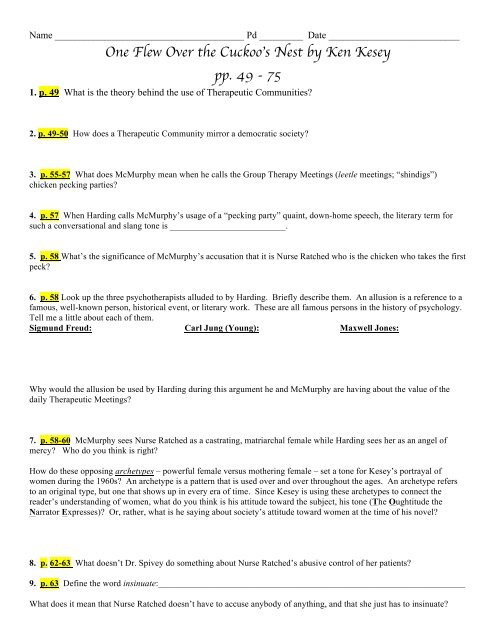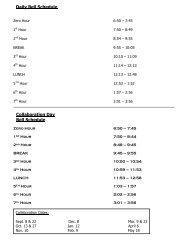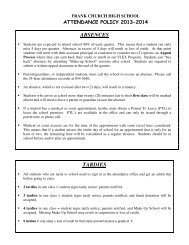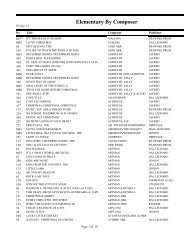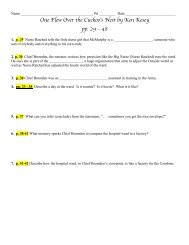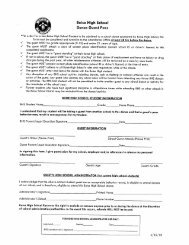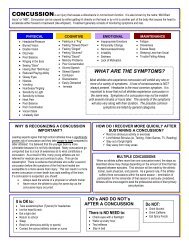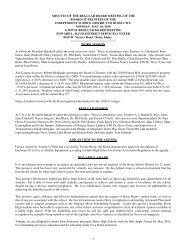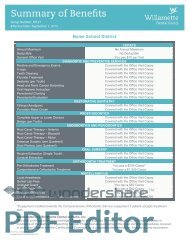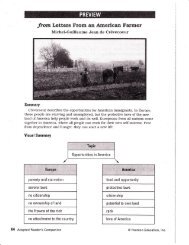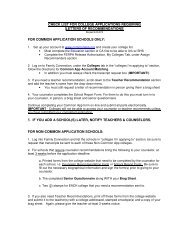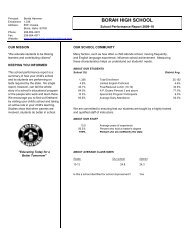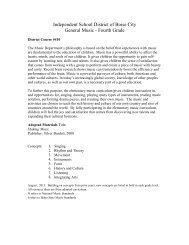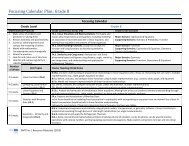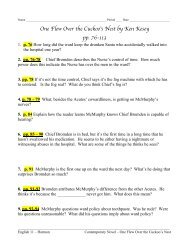One Flew Over the Cuckoo's Nest by Ken Kesey pp. 49 - 75
One Flew Over the Cuckoo's Nest by Ken Kesey pp. 49 - 75
One Flew Over the Cuckoo's Nest by Ken Kesey pp. 49 - 75
You also want an ePaper? Increase the reach of your titles
YUMPU automatically turns print PDFs into web optimized ePapers that Google loves.
Name _______________________________________ Pd _________ Date ___________________________<br />
<strong>One</strong> <strong>Flew</strong> <strong>Over</strong> <strong>the</strong> Cuckoo’s <strong>Nest</strong> <strong>by</strong> <strong>Ken</strong> <strong>Kesey</strong><br />
<strong>pp</strong>. <strong>49</strong> - <strong>75</strong><br />
1. p. <strong>49</strong> What is <strong>the</strong> <strong>the</strong>ory behind <strong>the</strong> use of Therapeutic Communities?<br />
2. p. <strong>49</strong>-50 How does a Therapeutic Community mirror a democratic society?<br />
3. p. 55-57 What does McMurphy mean when he calls <strong>the</strong> Group Therapy Meetings (leetle meetings; “shindigs”)<br />
chicken pecking parties?<br />
4. p. 57 When Harding calls McMurphy’s usage of a “pecking party” quaint, down-home speech, <strong>the</strong> literary term for<br />
such a conversational and slang tone is __________________________.<br />
5. p. 58 What’s <strong>the</strong> significance of McMurphy’s accusation that it is Nurse Ratched who is <strong>the</strong> chicken who takes <strong>the</strong> first<br />
peck?<br />
6. p. 58 Look up <strong>the</strong> three psycho<strong>the</strong>rapists alluded to <strong>by</strong> Harding. Briefly describe <strong>the</strong>m. An allusion is a reference to a<br />
famous, well-known person, historical event, or literary work. These are all famous persons in <strong>the</strong> history of psychology.<br />
Tell me a little about each of <strong>the</strong>m.<br />
Sigmund Freud: Carl Jung (Young): Maxwell Jones:<br />
Why would <strong>the</strong> allusion be used <strong>by</strong> Harding during this argument he and McMurphy are having about <strong>the</strong> value of <strong>the</strong><br />
daily Therapeutic Meetings?<br />
7. p. 58-60 McMurphy sees Nurse Ratched as a castrating, matriarchal female while Harding sees her as an angel of<br />
mercy? Who do you think is right?<br />
How do <strong>the</strong>se o<strong>pp</strong>osing archetypes – powerful female versus mo<strong>the</strong>ring female – set a tone for <strong>Kesey</strong>’s portrayal of<br />
women during <strong>the</strong> 1960s? An archetype is a pattern that is used over and over throughout <strong>the</strong> ages. An archetype refers<br />
to an original type, but one that shows up in every era of time. Since <strong>Kesey</strong> is using <strong>the</strong>se archetypes to connect <strong>the</strong><br />
reader’s understanding of women, what do you think is his attitude toward <strong>the</strong> subject, his tone (The Oughtitude <strong>the</strong><br />
Narrator Expresses)? Or, ra<strong>the</strong>r, what is he saying about society’s attitude toward women at <strong>the</strong> time of his novel?<br />
8. p. 62-63 What doesn’t Dr. Spivey do something about Nurse Ratched’s abusive control of her patients?<br />
9. p. 63 Define <strong>the</strong> word insinuate:_____________________________________________________________________<br />
What does it mean that Nurse Ratched doesn’t have to accuse anybody of anything, and that she just has to insinuate?
10. p. 64-65 How does Harding redeem himself as a chicken getting pecked at a pecking party <strong>by</strong> calling himself a rabbit<br />
instead of a chicken?<br />
11. p. 64-65 Do you think McMurphy is a wolf or a rabbit? Explain your opinion.<br />
12. p. 65 Does McMurphy think <strong>the</strong> Acutes are crazy or sane?<br />
13. p. 66 Why does McMurphy allude to <strong>the</strong> guys ganging up against each o<strong>the</strong>r, on <strong>the</strong> side of Nurse Ratched, as “a lot<br />
like a Red Chinese prison camp.” What’s <strong>the</strong> allusion mean?<br />
14. p. 68-69 Why is it dangerous to disobey Nurse Ratched in a Therapeutic meeting? What ha<strong>pp</strong>ens if you don’t<br />
answer? What ha<strong>pp</strong>ens if you become hostile toward her?<br />
15. p. 69 Describe electro-shock <strong>the</strong>rapy.<br />
16. p. 69 Harding is describing to McMurphy how one can turn out after receiving EST (electro-shock <strong>the</strong>rapy). When<br />
he says, “Or, look at Chief Broom clutching to his namesake <strong>the</strong>re beside you,” what is he referring to when he uses <strong>the</strong><br />
word “namesake”? What is he clutching to?<br />
17. p. 70 In <strong>the</strong> paragraph that begins with, “Hell, I don’t care. Vote on anything…,” how does this situation compare to<br />
citizens in <strong>the</strong> United States and <strong>the</strong>ir interaction with a democratic form of government?<br />
18. p. 70-71 Define matriarchy. Why do <strong>the</strong> men feel like <strong>the</strong>y are living in a matriarchal system under Nurse Ratched?<br />
19. p. 72 When McMurphy uses <strong>the</strong> colloquialism (conversational slang), “Because I’m getting just <strong>the</strong> shadiest notion<br />
of how to pick up a good purse off you birds in here.” What is he saying?<br />
20. p. 72-73 What is <strong>the</strong> strategy used <strong>by</strong> patients to avoid getting assigned to <strong>the</strong> Disturbed Ward or receiving EST for<br />
your behavior?<br />
21. p. 73 Harding says that <strong>the</strong> hospital regards Miss Ratched as its top nurse and grants her so much authority, because<br />
she’s a master of forcing <strong>the</strong> trembling libido – people’s biological urges for sexual pleasure or self-preservation – out into<br />
<strong>the</strong> open. What do you think is <strong>the</strong> danger in forcing one’s most basic instincts, such as <strong>the</strong> need to defend oneself for<br />
survival, out into <strong>the</strong> open?<br />
22. p. 73-74 What did McMurphy, in his perpetual search for new suckers, find out about <strong>the</strong> mental ward before he got<br />
<strong>the</strong>re?<br />
23. p. 74-<strong>75</strong> What bet does he make with <strong>the</strong> boys about Nurse Ratched? List at least two reasons why McMurphy is<br />
motivated to make this bet?


